智能手机上瘾英文论文
- 格式:docx
- 大小:20.19 KB
- 文档页数:3
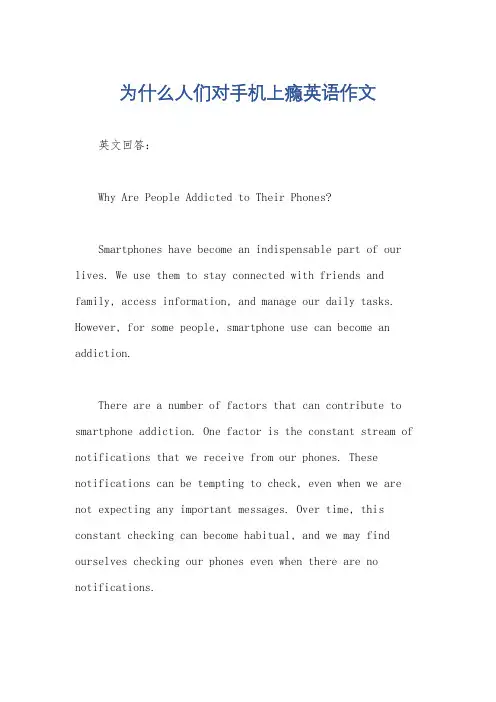
为什么人们对手机上瘾英语作文英文回答:Why Are People Addicted to Their Phones?Smartphones have become an indispensable part of our lives. We use them to stay connected with friends and family, access information, and manage our daily tasks. However, for some people, smartphone use can become an addiction.There are a number of factors that can contribute to smartphone addiction. One factor is the constant stream of notifications that we receive from our phones. These notifications can be tempting to check, even when we are not expecting any important messages. Over time, this constant checking can become habitual, and we may find ourselves checking our phones even when there are no notifications.Another factor that can contribute to smartphone addiction is the way that smartphones are designed. Smartphones are designed to be addictive. They are brightly colored, have a sleek design, and are easy to use. They also offer a wide range of features that can be engaging, such as games, social media, and streaming video.In addition to these external factors, there are also some internal factors that can make people more susceptible to smartphone addiction. People who are bored, lonely, or stressed may be more likely to turn to their phones for comfort or distraction.Smartphone addiction can have a number of negative consequences. It can lead to problems at work or school, relationship problems, and health problems. If you think that you may be addicted to your smartphone, there are a number of things that you can do to reduce your usage.One thing that you can do is to set limits on your smartphone use. You can set a timer for how long you can use your phone each day, or you can disable certain appsduring certain times of the day.Another thing that you can do is to find other ways to occupy your time. Try picking up a new hobby, spending time with friends and family, or getting involved in your community.If you are struggling to reduce your smartphone use on your own, you may want to consider seeking professional help. A therapist can help you to identify the underlying causes of your addiction and develop strategies for coping with it.中文回答:人们为什么沉迷于手机?智能手机已经成为我们生活中不可或缺的一部分。
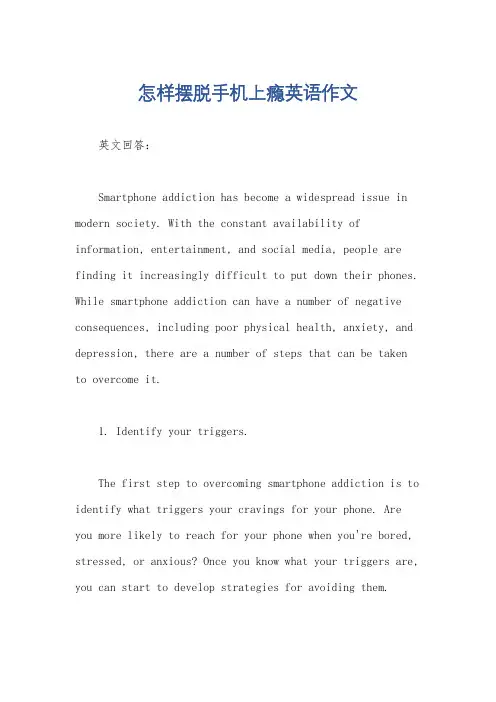
怎样摆脱手机上瘾英语作文英文回答:Smartphone addiction has become a widespread issue in modern society. With the constant availability of information, entertainment, and social media, people are finding it increasingly difficult to put down their phones. While smartphone addiction can have a number of negative consequences, including poor physical health, anxiety, and depression, there are a number of steps that can be taken to overcome it.1. Identify your triggers.The first step to overcoming smartphone addiction is to identify what triggers your cravings for your phone. Are you more likely to reach for your phone when you're bored, stressed, or anxious? Once you know what your triggers are, you can start to develop strategies for avoiding them.2. Set limits for yourself.Once you know what your triggers are, you can start to set limits for yourself. For example, you might decide to only use your phone for a certain amount of time each day, or you might only use it in certain situations. Setting limits will help you to gradually reduce your phone usage.3. Find other activities to do.When you're not using your phone, it's important to find other activities to do. This could include spending time with friends and family, reading, exercising, or pursuing a hobby. Finding other activities to do will help you to reduce your dependence on your phone.4. Seek professional help.If you're struggling to overcome smartphone addiction on your own, you may want to consider seeking professional help. A therapist can help you to identify the underlying causes of your addiction and develop strategies forovercoming it.中文回答:如何摆脱手机成瘾。
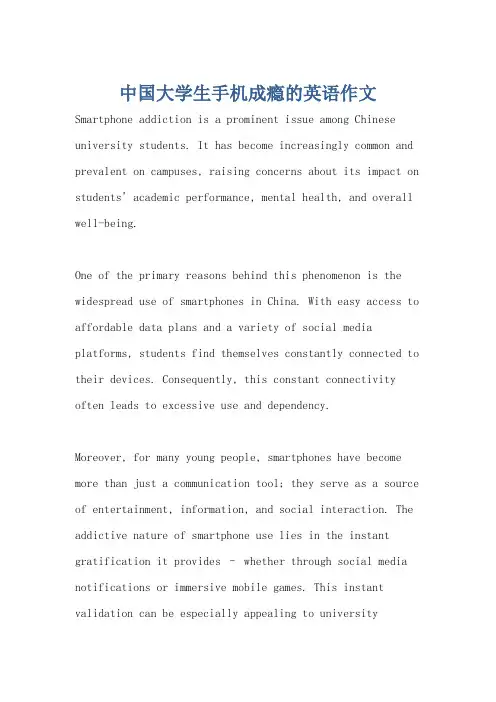
中国大学生手机成瘾的英语作文Smartphone addiction is a prominent issue among Chinese university students. It has become increasingly common and prevalent on campuses, raising concerns about its impact on students' academic performance, mental health, and overall well-being.One of the primary reasons behind this phenomenon is the widespread use of smartphones in China. With easy access to affordable data plans and a variety of social media platforms, students find themselves constantly connected to their devices. Consequently, this constant connectivity often leads to excessive use and dependency.Moreover, for many young people, smartphones have become more than just a communication tool; they serve as a source of entertainment, information, and social interaction. The addictive nature of smartphone use lies in the instant gratification it provides – whether through social media notifications or immersive mobile games. This instant validation can be especially appealing to universitystudents who are navigating through various pressures and challenges in their academic and personal lives.The consequences of smartphone addiction can be detrimental. Academic performance frequently suffers as a result of excessive screen time and distraction. Students may find it challenging to concentrate on their studies or engage effectively during classroom lectures due to their preoccupation with their phones. Additionally, an over-reliance on smartphones for information and entertainment can hinder critical thinking skills and reduce productivity.Furthermore, prolonged exposure to screens has been associated with adverse effects on mental health. Excessive smartphone use has been linked to increased levels of stress, anxiety, and depression among university students. The endless scrolling through social media feeds can create feelings of inadequacy or lead to unhealthy comparisonswith others’ seemingly perfect lives portrayed online.To address this concerning issue, proactive measures needto be taken at both individual and institutional levels.Universities should provide education about responsible smartphone usage and promote balanced lifestyles that prioritize offline activities such as physical exercise, face-to-face communication, and hobbies.Additionally, fostering an environment where open discussions regarding technology habits are encouraged can help raise awareness about the potential negative impacts of excessive smartphone use. Encouraging digital detoxes or designated "unplugged" times within university dormitories or common areas could also aid in reducing dependency on smartphones.On an individual level, self-awareness is key; students must recognize signs of smartphone addiction within themselves and take proactive steps towards moderation. Implementing strategies such as setting daily time limits for phone usage, designating specific periods for digital disconnection (especially before bedtime), or seeking alternative forms of relaxation that don't involve screens are crucial steps in combating this addiction.In conclusion, addressing smartphone addiction among Chinese university students requires a multi-faceted approach involving both educational institutions and individual awareness. By promoting healthy tech habits and encouraging balanced lifestyles that extend beyond screen time, we can work towards mitigating the adverse effects associated with excessive smartphone usage within this demographic.。
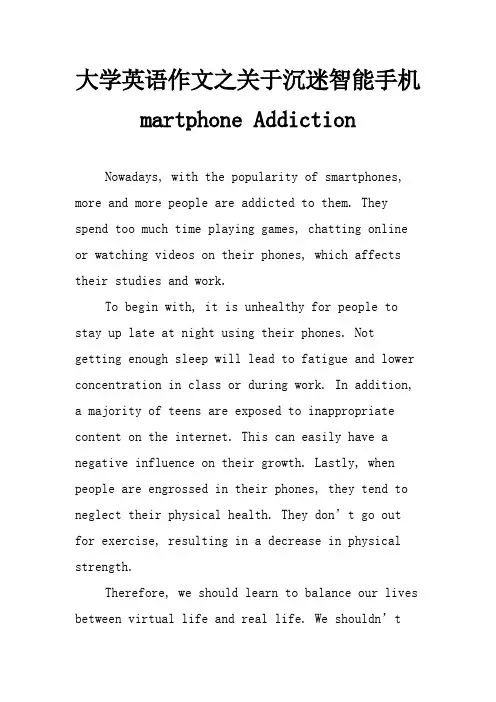

手机的过度使用英语作文Technology has become an indispensable part of our lives. We often hear about people who overuse their smartphones, and this phenomenon has been coined "smartphone addiction". In this essay, I will explore the root causes of smartphone addiction. I will also discuss the potential harms of overusing smartphones and offer some tips for overcoming this addiction.There are a few factors that can contribute to smartphone addiction. One is the constant notificationsthat we receive from our phones. Every time we get a text, email, or social media update, our brains release a small amount of dopamine, which is a neurotransmitter that makes us feel good. This can lead to a cycle of addiction, as we keep checking our phones in order to get that dopamine hit.Another factor that can contribute to smartphone addiction is the way that our phones are designed to be addictive. Many social media apps, for example, usealgorithms that show us content that is specifically tailored to our interests. This can make it very difficult to put our phones down, even when we know that we should.There are a number of potential harms associated with smartphone addiction. One is that it can lead to social isolation. When we spend too much time on our phones, we are less likely to interact with people in person. This can lead to loneliness and depression.Another potential harm of smartphone addiction is that it can affect our physical health. When we spend too much time on our phones, we are less likely to exercise or get enough sleep. This can lead to weight gain and other health problems.If you think you may be addicted to your smartphone, there are a few things you can do to overcome this addiction. One is to set limits on how much time you spend on your phone each day. You can also turn off notifications for non-essential apps and make a conscious effort to spend more time interacting with people in person.Overcoming smartphone addiction can be challenging, but it is possible. If you are struggling with this addiction, please don't hesitate to seek help from a mental health professional.中文回答:手机已经成为我们生活中不可或缺的一部分。
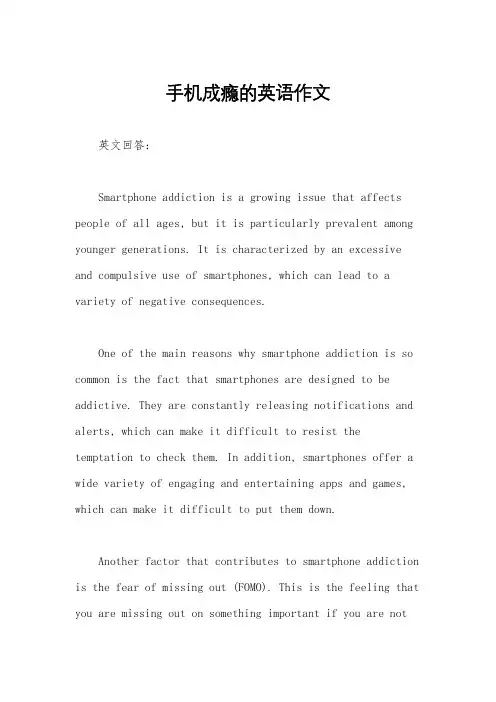
手机成瘾的英语作文英文回答:Smartphone addiction is a growing issue that affects people of all ages, but it is particularly prevalent among younger generations. It is characterized by an excessive and compulsive use of smartphones, which can lead to a variety of negative consequences.One of the main reasons why smartphone addiction is so common is the fact that smartphones are designed to be addictive. They are constantly releasing notifications and alerts, which can make it difficult to resist the temptation to check them. In addition, smartphones offer a wide variety of engaging and entertaining apps and games, which can make it difficult to put them down.Another factor that contributes to smartphone addiction is the fear of missing out (FOMO). This is the feeling that you are missing out on something important if you are notconstantly connected to your smartphone. FOMO can be a powerful motivator, and it can lead to people spending excessive amounts of time on their phones.Smartphone addiction can have a number of negative consequences. For example, it can lead to problems with sleep, attention, and relationships. It can also interfere with work and school performance. In some cases, smartphone addiction can even lead to mental health problems, such as depression and anxiety.If you are concerned that you or someone you know may be addicted to smartphones, there are a number of things you can do to help. First, it is important to talk to a healthcare professional about your concerns. They can help you to diagnose the problem and develop a treatment plan.In addition to getting professional help, there are a number of things you can do on your own to reduce your smartphone use. For example, you can try setting limits on how much time you spend on your phone each day. You can also try turning off your phone at night. Finally, you cantry to find other activities to replace the time you spend on your phone.If you are struggling with smartphone addiction, it is important to know that you are not alone. There are many people who have successfully overcome this addiction, and you can too. With the right help and support, you can break free from the grip of smartphone addiction and regain control of your life.中文回答:智能手机成瘾是一个日益严重的问题,它影响着各个年龄段的人,但在年轻一代中尤为普遍。
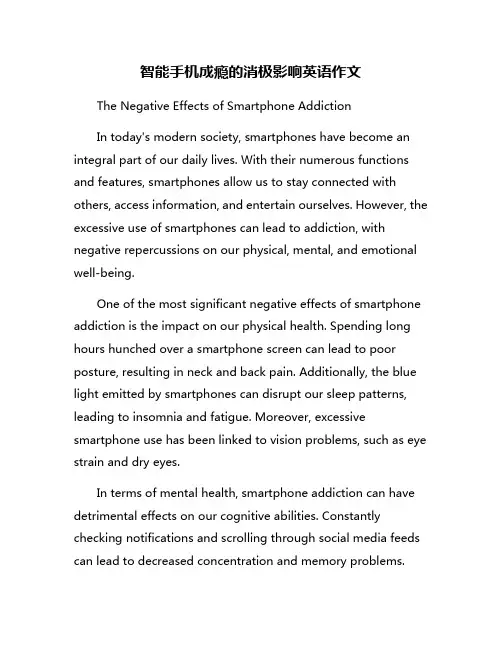
智能手机成瘾的消极影响英语作文The Negative Effects of Smartphone AddictionIn today's modern society, smartphones have become an integral part of our daily lives. With their numerous functions and features, smartphones allow us to stay connected with others, access information, and entertain ourselves. However, the excessive use of smartphones can lead to addiction, with negative repercussions on our physical, mental, and emotional well-being.One of the most significant negative effects of smartphone addiction is the impact on our physical health. Spending long hours hunched over a smartphone screen can lead to poor posture, resulting in neck and back pain. Additionally, the blue light emitted by smartphones can disrupt our sleep patterns, leading to insomnia and fatigue. Moreover, excessive smartphone use has been linked to vision problems, such as eye strain and dry eyes.In terms of mental health, smartphone addiction can have detrimental effects on our cognitive abilities. Constantly checking notifications and scrolling through social media feeds can lead to decreased concentration and memory problems.Moreover, the instant gratification provided by smartphones can reduce our patience and ability to delay gratification, leading to impulsive behavior.Emotionally, smartphone addiction can negatively impact our relationships with others. Excessive smartphone use can lead to feelings of isolation and loneliness, as we prioritize virtual interactions over face-to-face communication. Moreover, constantly comparing ourselves to others on social media can result in low self-esteem and anxiety.Furthermore, smartphone addiction can have financial consequences. The constant need to upgrade to the latest smartphone model and purchase apps and in-app purchases can lead to overspending and financial instability. Moreover, the use of smartphones while driving can increase the risk of accidents and legal consequences.In conclusion, while smartphones have brought many benefits to our lives, the negative effects of smartphone addiction cannot be overlooked. It is important to be mindful of our smartphone usage and establish healthy boundaries to prevent addiction. By prioritizing real-life interactions, practicing digital detoxes, and seeking professional help if needed, we canmitigate the negative effects of smartphone addiction and lead a balanced and fulfilling life.。
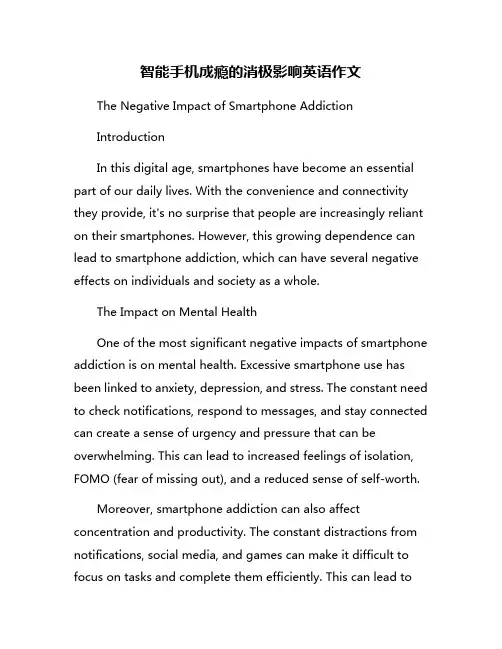
智能手机成瘾的消极影响英语作文The Negative Impact of Smartphone AddictionIntroductionIn this digital age, smartphones have become an essential part of our daily lives. With the convenience and connectivity they provide, it's no surprise that people are increasingly reliant on their smartphones. However, this growing dependence can lead to smartphone addiction, which can have several negative effects on individuals and society as a whole.The Impact on Mental HealthOne of the most significant negative impacts of smartphone addiction is on mental health. Excessive smartphone use has been linked to anxiety, depression, and stress. The constant need to check notifications, respond to messages, and stay connected can create a sense of urgency and pressure that can be overwhelming. This can lead to increased feelings of isolation, FOMO (fear of missing out), and a reduced sense of self-worth.Moreover, smartphone addiction can also affect concentration and productivity. The constant distractions from notifications, social media, and games can make it difficult to focus on tasks and complete them efficiently. This can lead todecreased academic or work performance and an overall sense of dissatisfaction and frustration.The Impact on Physical HealthIn addition to mental health concerns, smartphone addiction can also have negative effects on physical health. The sedentary nature of smartphone use can lead to a decrease in physical activity, which can contribute to weight gain, obesity, and other health issues. Prolonged periods of screen time can also lead to eye strain, headaches, and disrupted sleep patterns.Furthermore, excessive smartphone use has been linked to poor posture and musculoskeletal problems. The constant bending of the neck and hunching over the screen can put a strain on the neck, shoulders, and back, leading to long-term health issues such as neck pain, back pain, and spinal misalignment.The Impact on RelationshipsAnother consequence of smartphone addiction is its impact on relationships. Excessive smartphone use can lead to a lack of communication and connection with loved ones. People may become more focused on their devices than on interacting withthose around them, leading to feelings of neglect, loneliness, and disconnection.Moreover, smartphone addiction can also lead to conflicts and misunderstandings within relationships. The constant distractions and interruptions from smartphones can disrupt conversations and quality time spent together, leading to frustration and resentment from both parties. This can strain relationships and create barriers to effective communication and emotional intimacy.The Impact on SocietyThe negative impact of smartphone addiction is not limited to individuals; it also has broader implications for society as a whole. As more and more people become addicted to their smartphones, there is a growing concern about the social and cultural effects of this phenomenon.One major concern is the impact of smartphone addiction on social interactions and social skills. The reliance on digital communication and social media can lead to a decrease in face-to-face interactions and interpersonal relationships. This can have repercussions for social cohesion, empathy, and community engagement in the long term.Moreover, smartphone addiction can also contribute to a culture of instant gratification and short attention spans. The constant availability of information, entertainment, and communication on smartphones can foster a sense of impatience and a need for immediate satisfaction. This can lead to a lack of resilience, perseverance, and the ability to delay gratification, which are essential skills for personal growth and success.ConclusionIn conclusion, the negative impact of smartphone addiction is multifaceted and far-reaching. From mental health concerns to physical health issues, from strained relationships to societal implications, smartphone addiction can have serious consequences for individuals and society as a whole. It is essential for individuals to be aware of their smartphone use and to cultivate a healthy and balanced relationship with their devices. By taking proactive steps to limit screen time, establish boundaries, and prioritize real-life connections, we can mitigate the harmful effects of smartphone addiction and promote overall well-being and fulfillment.。
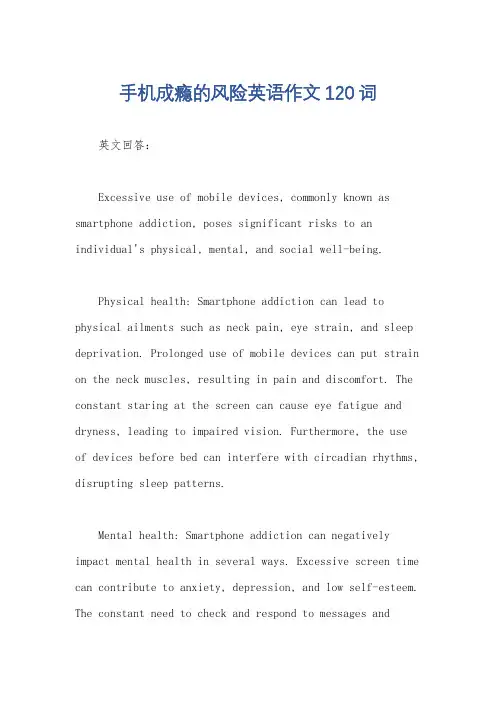
手机成瘾的风险英语作文120词英文回答:Excessive use of mobile devices, commonly known as smartphone addiction, poses significant risks to an individual's physical, mental, and social well-being.Physical health: Smartphone addiction can lead to physical ailments such as neck pain, eye strain, and sleep deprivation. Prolonged use of mobile devices can put strain on the neck muscles, resulting in pain and discomfort. The constant staring at the screen can cause eye fatigue and dryness, leading to impaired vision. Furthermore, the use of devices before bed can interfere with circadian rhythms, disrupting sleep patterns.Mental health: Smartphone addiction can negatively impact mental health in several ways. Excessive screen time can contribute to anxiety, depression, and low self-esteem. The constant need to check and respond to messages andnotifications can lead to feelings of anxiety and stress. Social media usage, a common feature of smartphone use, can foster unhealthy comparisons and negative body image perceptions, contributing to low self-esteem.Social relationships: Smartphone addiction caninterfere with social interactions and harm relationships. Individuals engrossed in their devices may neglect face-to-face conversations, leading to social isolation. Constant attention to mobile notifications can disrupt social settings, causing annoyance to others and hindering genuine connections.Cognitive abilities: Research suggests that smartphone addiction may impair cognitive abilities, particularly attention and memory. The constant distraction and multitasking associated with smartphone use can hinder sustained attention and focus. Additionally, the reliance on smartphones for information storage may reduce the need for active recall, leading to a decline in memory function.中文回答:手机成瘾的风险。
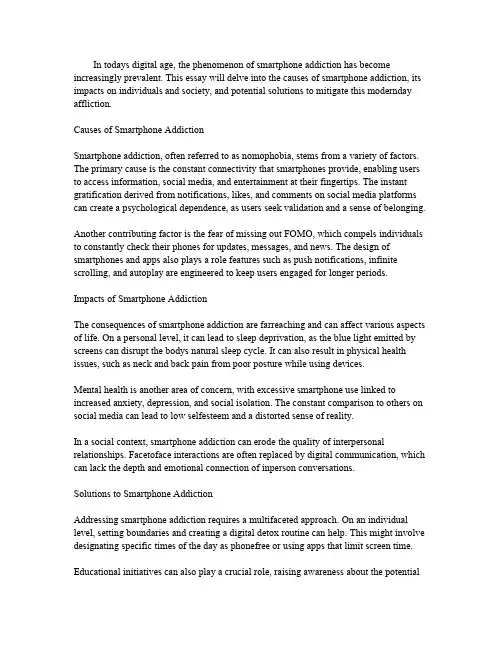
In todays digital age,the phenomenon of smartphone addiction has become increasingly prevalent.This essay will delve into the causes of smartphone addiction,its impacts on individuals and society,and potential solutions to mitigate this modernday affliction.Causes of Smartphone AddictionSmartphone addiction,often referred to as nomophobia,stems from a variety of factors. The primary cause is the constant connectivity that smartphones provide,enabling users to access information,social media,and entertainment at their fingertips.The instant gratification derived from notifications,likes,and comments on social media platforms can create a psychological dependence,as users seek validation and a sense of belonging.Another contributing factor is the fear of missing out FOMO,which compels individuals to constantly check their phones for updates,messages,and news.The design of smartphones and apps also plays a role features such as push notifications,infinite scrolling,and autoplay are engineered to keep users engaged for longer periods.Impacts of Smartphone AddictionThe consequences of smartphone addiction are farreaching and can affect various aspects of life.On a personal level,it can lead to sleep deprivation,as the blue light emitted by screens can disrupt the bodys natural sleep cycle.It can also result in physical health issues,such as neck and back pain from poor posture while using devices.Mental health is another area of concern,with excessive smartphone use linked to increased anxiety,depression,and social isolation.The constant comparison to others on social media can lead to low selfesteem and a distorted sense of reality.In a social context,smartphone addiction can erode the quality of interpersonal relationships.Facetoface interactions are often replaced by digital communication,which can lack the depth and emotional connection of inperson conversations.Solutions to Smartphone AddictionAddressing smartphone addiction requires a multifaceted approach.On an individual level,setting boundaries and creating a digital detox routine can help.This might involve designating specific times of the day as phonefree or using apps that limit screen time.Educational initiatives can also play a crucial role,raising awareness about the potentialharms of excessive smartphone use and promoting healthier digital habits among the youth and adults alike.Technological solutions,such as features that allow users to monitor and control their app usage,can empower individuals to take control of their digital lives.Additionally,app developers and manufacturers can contribute by designing products that prioritize user wellbeing over engagement.ConclusionSmartphone addiction is a complex issue that demands attention and action.By understanding its causes and impacts,we can work towards developing strategies that promote a balanced relationship with technology.Ultimately,it is about finding harmony between the benefits of connectivity and the preservation of our wellbeing and personal interactions.。
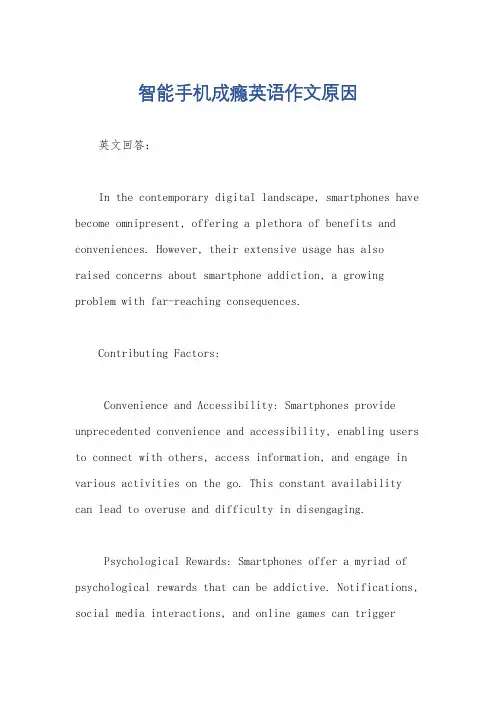
智能手机成瘾英语作文原因英文回答:In the contemporary digital landscape, smartphones have become omnipresent, offering a plethora of benefits and conveniences. However, their extensive usage has also raised concerns about smartphone addiction, a growing problem with far-reaching consequences.Contributing Factors:Convenience and Accessibility: Smartphones provide unprecedented convenience and accessibility, enabling users to connect with others, access information, and engage in various activities on the go. This constant availability can lead to overuse and difficulty in disengaging.Psychological Rewards: Smartphones offer a myriad of psychological rewards that can be addictive. Notifications, social media interactions, and online games can triggerdopamine release, creating a sense of gratification and pleasure.Fear of Missing Out (FOMO): The constant stream of updates and social media posts can create a sense of FOMO, leading users to feel compelled to check their phones frequently to avoid missing any important information or social interactions.Time-saving Illusion: Smartphones can create the illusion of saving time by providing quick access to tasks and information. However, excessive usage can actually lead to procrastination and decreased productivity.Social Pressure: In certain social circles, smartphone ownership and usage can become a status symbol or a means of fitting in. This can contribute to peer pressure and the desire to conform to perceived norms.Consequences of Smartphone Addiction:Mental Health Issues: Smartphone addiction can lead tomental health problems such as depression, anxiety, and sleep disturbances. Excessive screen time can disrupt sleep patterns, impair cognitive function, and contribute to negative emotions.Physical Health Problems: Prolonged smartphone usage can result in physical health issues such as eye strain, neck pain, and poor posture. Holding smartphones for extended periods can put stress on the body's musculoskeletal system.Relationship Problems: Smartphone addiction can interfere with relationships by reducing face-to-face interactions, causing distraction during social events, and creating conflict with partners who may feel neglected.Academic and Career Impact: Excessive smartphone use can negatively impact academic performance and career prospects. It can lead to decreased focus, impaired memory, and difficulty completing tasks on time.Financial Burden: Smartphones and data plans can beexpensive, and excessive usage can put a strain on personal finances.Overcoming Smartphone Addiction:Identify Triggers: Begin by identifying the specific situations, emotions, or activities that trigger your smartphone usage. Understanding these triggers can help you develop strategies to avoid or manage them.Set Boundaries: Establishing clear boundaries for smartphone use can help prevent excessive consumption. Designate specific times and places where smartphone usage is limited or prohibited.Engage in Alternative Activities: Find alternative activities to engage in when you feel the urge to reach for your smartphone. Engaging in hobbies, spending time with loved ones, or pursuing physical activity can provide a healthier outlet.Seek Professional Help: If you struggle to overcomesmartphone addiction on your own, consider seeking professional help. Therapists and counselors can provide support, guidance, and coping mechanisms.Mindful Usage: Practice mindful usage by paying attention to your thoughts and feelings while interacting with your smartphone. Notice when you are using it out of habit or boredom, and make conscious choices about how you use it.中文回答:导致智能手机成瘾的原因:便利性和可及性,智能手机提供前所未有的便利和可及性,使用户能够随时随地与他人联系、获取信息并参与各种活动。
关于手机成瘾的英语作文Smartphone Addiction 智能手机成瘾As the development of modern technology, Smartphone has become quite popular all over the world with its outstanding functions. People can use phones to surf the Internet, their personal micro blog, and upload their latest pictures atany place, anytime. It seems that smart phones have already become an indispensable part in people’s daily lives. However, some people are indulgingin smart phones, which already have side-effect on their normal life.随着当代科技的迅速发展,智能手机以其卓越的功能风靡全球。
人们可以在任何时间、任何地点用它来上网,更新个人微博,上传自己的最新照片。
看起来智能手机已经成为人们生活中不可缺的一部分了。
然而,有些人过渡沉迷于智能手机,以至于影响了正常生活。
Somepeople, especially teenagers, are easily fall for smartphone for these reasons.First of all, nowadays, people are under great pressure, while cell phone provides a platform for people to relax themselves. By playing mini-games,vocal chatting with friends, watching movies and listening to music, people caneasily forget their problems temporary. Second, there are always something new on the phone. It is can be interesting, mysterious and various. So people areeager to turn on their phones, want to know what is happening around them. When people spend too much time on the phones, they don’t have enough chance to communicate with their friends or parents. Their attentions have been drawn awayby the virtual world. Lack of good self-control, they are fragile to the smartphone addiction, while they supposed to focus on their study and work.一些人,特别是青少年,极容易被智能手机吸引。
手机成瘾英文作文English:Excessive smartphone usage has become a prevalent issue in modern society, leading to various detrimental consequences on individuals' physical, mental, and social well-being. Addiction to smartphones is fueled by a combination of factors, including the constant access to social media, gaming, and instant communication platforms, which provide instant gratification and stimulation. The addictive nature of smartphones is also exacerbated by the design of apps and interfaces, engineered to capture and retain users' attention through features like notifications, likes, and rewards systems. Moreover, the widespread availability and affordability of smartphones have made them ubiquitous, blurring the boundaries between work, leisure, and personal time. This seamless integration of smartphones into every aspect of life makes it challenging for individuals to disconnect and establish healthy usage boundaries. Consequently, prolonged and excessive smartphone use has been linked to a myriad of negative consequences, such as decreased productivity, disrupted sleep patterns, increased anxiety and depression, diminished face-to-face interactions, and even physicalhealth issues like eye strain and musculoskeletal problems. To address this issue, a multifaceted approach is necessary, involving education about healthy technology habits, development of digital literacy skills, implementation of parental controls and workplace policies, and fostering a supportive environment that encourages moderation and balance in smartphone usage.中文翻译:手机过度使用已经成为当代社会的普遍问题,对个人的身体、心理和社会福祉造成了各种不利影响。
智能手机成瘾的影响英语作文150英文回答:Smartphones have become an indispensable part of our lives. They offer a plethora of benefits, from staying connected with friends and family to accessing information and entertainment. However, the downside of smartphone usage is becoming increasingly apparent: smartphone addiction.Smartphone addiction is a growing problem, especially among young people. It can lead to a variety of negative consequences, including:Reduced academic performance.Sleep deprivation.Social isolation.Mental health problems.Physical health problems.Reduced academic performance is one of the most common consequences of smartphone addiction. When students are constantly on their phones, they are less likely to pay attention in class and complete their homework. This can lead to lower grades and a decreased ability to succeed in school.Sleep deprivation is another common problem associated with smartphone addiction. The blue light emitted from smartphones can interfere with sleep, making it difficult to fall asleep and stay asleep. This can lead to daytime fatigue, difficulty concentrating, and irritability.Social isolation is another consequence of smartphone addiction. When people are constantly on their phones, they are less likely to interact with others in person. This can lead to feelings of loneliness and isolation.Mental health problems are also associated with smartphone addiction. Studies have shown that people who are addicted to their smartphones are more likely to experience symptoms of depression, anxiety, and other mental health problems.Physical health problems can also result from smartphone addiction. For example, people who are constantly on their phones may experience neck pain, eye strain, and carpal tunnel syndrome.If you are concerned that you or someone you know may be addicted to their smartphone, there are a number of things you can do to help. First, it is important to recognize the signs and symptoms of smartphone addiction. These include:Spending excessive amounts of time on your smartphone.Feeling anxious or restless when you are not on your smartphone.Using your smartphone to avoid other activities.Neglecting your responsibilities in order to use your smartphone.Continuing to use your smartphone even when it is causing you problems.If you recognize any of these signs and symptoms in yourself or someone you know, it is important to seek help. There are a number of resources available to help people overcome smartphone addiction. These resources include:Therapy.Support groups.Smartphone addiction apps.中文回答:智能手机成瘾的影响。
Smartphone Addiction introduction An operating system and apps make a mobile phone a smartphone which is a true multimedia device. Like having a desktop in your pocket.It is nothing strange to wake up using your smartphone and go to bed using it too. While that is still ok, it may be a real problem when you use it while you are eating, while in the class.
What is smartphone addiction? Smartphone addiction is an addiction that can be harmful to user’s live outside of mobile devices, including smartphones. Although it is not an official addiction, it is now a prevalent worldwide problem, as it causes trauma and anxiety and other symptoms.different from the dependence on the phone, addiction is the individual acts out of control, leading their physical, psychological and social functioning was significantly impaired.Mobile Phone Use by Resident Doctors: Tendency to Addiction-Like BehaviourMunishAggarwal, Sandeep Grover, and Debasish Basu2012The signs of addiction include carrying it anywhere, feeling panic when it’s out of your sight, and feeling like lost a friend when it is broken. When an addictive person is without mobile phone or out of battery he will feel anxious and uneasy, which is called no mobile phobia. M. Takao, S Takahashi, & M. Kitamura. Addictive Personality and Problematic Mobile Phone Use, CyberPsychology and Behavior. 2009. Print.Too much use of phone in our lives can cause problems both in the life of the phone user and his or her friends.
2the effect Addiction decreases the academic performance, communication skills, social relation, and it also causes psychological problems and sometimes even death. Addiction specialist Michael Dow said some people experience withdrawal symptoms like anxiety, insomnia and depression .Most college students spend their most time on computer, smart phone and internet system and forget their surrounding activities.it is uncomfortable for them to make conversation with their own friends face to face. Psychologists argue that the dependence on smart phones is so strong that if the user can not leave his or her phnoe, s/he suffers from actual withdrawal symptoms, S/he becomes restless and easily gets irritated. It occurs because the mobile phone becomes a part of his/her daily life and controls his/her whole life style either directly or indirectly. Sanchez-Martinez, M ; Otero, A. Factors Associated with Cell Phone Use in Adolescents in the Community of Madrid2009. New research by the Institute of Advanced Motorists (IAM) claims using smartphones for social networking while driving is more dangerous than drink-driving because using a smartphone for social networking slows reaction times by 37.6%
3What causses it The main reason for the cell phone addiction may be the clever marketing makes the cell phone become a status symbol. Having the phone has become a way to identify oneself.Everyone likes to have a phone to build a magnificent life full of vivid images for themselves. Smartphones keep people entertained and engagedand make their live colorful and connective. Best of all, all this fits into a pocket. The incredible mobility and flexibility life intoxicates people, leading to smartphone-induced highs.scmp"One thing my research made clear is that human beings have a deep, primitive desire to know everything that's going on around them," Carr says.The 21st century is the information age, people desire to obtain all the information.The mobile phone is one of the best tools to access information and be able to immediately satisfy people's curiosity. That makes people can’t leave the phone.
ConclusionThe famous psychological self-help blog spiritual river gives a few recipes for the crowd of cell phone addiction. The first thing is to establish a clear self-awareness, aware of the problem of mobile phone dependence and the determination to correct the bad habits. The second is to reduce the use of mobile phones, try to make it sure it is necessary before pick up the phone, and even let friends to help you .and less to send text messages or delete too much waste of time mobile applications. Finally, a clear restriction is a good way to self-monitoring.